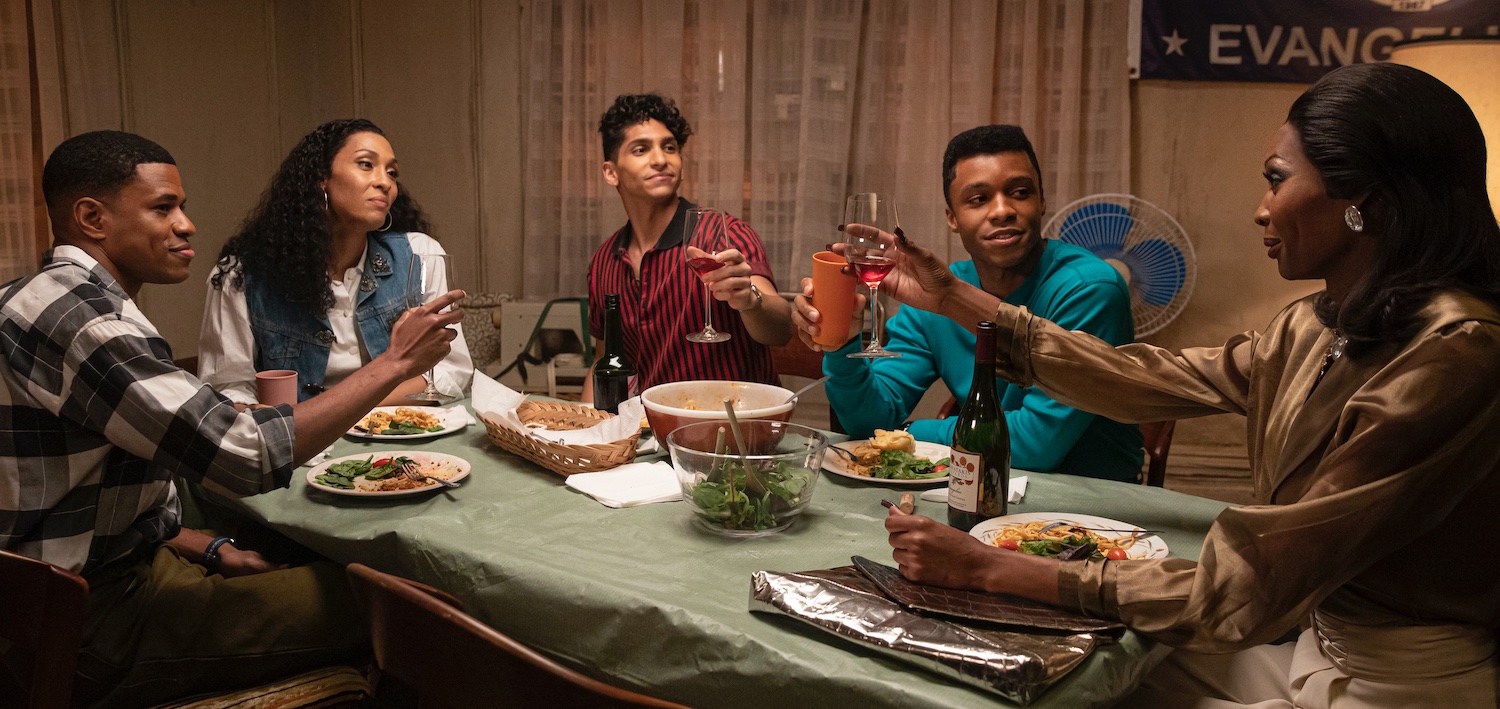What to Watch Verdict
In its final season, 'Pose' has settled into a satisfying if comfortable groove resolving its interpersonal and historical problems as optimistically as possible.
Pros
- +
👠 Jackson shows remarkable depth — but also consistency — as Elektra, a future house mother who would never be a shrinking violet.
- +
👠 A great flashback ball shows the cheap origins of what becomes a great house of glamour.
Cons
- -
👠 As heartwrenching as some scenes are between Elektra and her mother, the resolution of that pain — and a lot of complicated relationships — leans too frequently towards a simple and positive conclusion.
This post contains spoilers for Pose "The Trunk"
Check out our last review here.
“The Trunk” starts with a flashback in 1978 — a step backwards not only for the ballroom community, but more specifically for Elektra (Dominique Jackson), who’s turning tricks for $75, a six pack of beer and the promise of a McDonald’s apple pie after services have been rendered. Despite her fantasies about a future in which she lives in an apartment whose closet is filled with furs and where Studio 54 waits to get started until she’s ready, Elektra is decidedly less sanguine about returning to her mother’s home at 4:00am in her streetwalking clothes after her companion loses her keys. Her fears prove right as her mother dresses her down for entering wearing a dress. “I told you I don’t want a cross dressing homosexual in my home,” her mother says coldly before tearing at her clothes. But Elektra gathers her things and tells her mother off: “I don’t accept abuse and humiliation in the streets — and I certainly won’t accept it from you.”
After being thrown out, Elektra composes herself and confronts her one last time. “This is who I am, mother dear,” she says before defiantly walking away. It’s an encouraging moment of empowerment, but it evidences the show’s increasing reluctance to present these characters with a pessimistic (if also depressingly realistic) experience as gay and/or trans people of color. If in the first season, Blanca’s (MJ Rodriguez) children came from broken homes and abusive relationships, the portrayals now lean eagerly towards the characters finding comfort, reassurance, liberation and confidence — all things wished upon their real and imaginary counterparts, but not always a great foundation for good television drama, and certainly not across multiple episodes, much less a full season or series. Nevertheless, if anyone could emerge fearlessly from a mother’s scorn and become a constellation in this universe, it’s Elektra.
16 years later, she’s running a phone sex bank as a couple of cops watch unhappily from an unmarked car. Working at the behest of Mayor Guiliani, the cops squeeze Elektra about her operation in the hopes for a high-end client or possibly a connection to the Mafia; but when they threaten to search her apartment, she calls Blanca for help disposing of the trunk stashed in her closet, where several years prior, she hid the body of a client from the Hellfire Club who died in her custody. Ricky (Dyllon Burnside) and Lil Papi (Angel Bismark Curiel) are reluctant to help — especially after Blanca reveals what’s inside the trunk — but moving it dredges up memories of early days with Elektra, when Blanca was a glorified handmaiden to Lulu (Hailie Sahar) and the late Candy (Angelica Ross).
It was during this time that Elektra recruited Angel (Indya Moore), Lemar (Jason A. Rodriguez) and Cubby (Jeremy McClain) into what would become the House of Abundance. But when the power to Elektra’s apartment gets shut off, she gathers them to reclaim something that she claims as hers: a trunk full of furs and old clothing her mother insisted she leave behind. After they clumsily break in, her mother wakes up and rebukes her child for disappointing her — most of all for “depriving” her of what she thinks is hers. “I am more ferocious than any man,” responds Elektra, “especially when it comes to protecting what’s mine.” They momentarily consider a reconciliation before Elektra realizes that her mother will never fully understand or accept her how she is, and they leave with the trunk.
As Blanca contemplates what to do with the trunk, Christopher (Jeremy Pope) arrives at her apartment and immediately smells the odor emanating from Elektra’s trunk. After a brief confrontation, she reveals the truth to him, prompting a conversation that unfortunately feels more like a speech to the audience than to each other about the adversity that trans people face. Christopher capitulates, and reminds her that he is there for her — and the family as a whole; and now that everyone knows, they band together to bail Elektra out and resolve her “problem.” “It’s going to take a team to clear the skeleton out of your closet,” rejoins Blanca. Elektra is uneasy as they prepare to dump the body, discarding a secret that has become part of her history, and possibly her identity.
Time comes to toss the trunk off a pier, and she walks away without a second look, accepting an act of good fortune and grace she observes that the deceased might suggest she doesn’t deserve. But when Christopher reveals that he called in a favor to get Elektra’s charges dropped, she storms off, unprepared for an act of generosity — and absolution — she fears she cannot repay. Blanca explains to her that she sees the sacrifice her mother made for her all of those years ago by saying goodbye to her own mother, and selling the fineries once locked away in that trunk in order to finance their first true family apartment. Nevertheless, they bemusedly recall the first ball where Elektra’s newly-assembled children walked all together as a family, a fairy tale affair set to Donna Summer’s “Once Upon A Time” and climaxing with Elektra arriving as The Wicked Queen. “That’s how you do it, motherfuckers,” says Pray Tell (Billy Porter), as they earn tens across the board.
Certainly as the series wraps up its many storylines, there’s something gratifying about the way each character meets with her or his destiny in thoughtful and sensitive ways. And the historic way that this show portrays characters like these that have never been seen so fully dimensionalized before encourages a sense of latitude and generosity towards them, especially since it never forgets the looming danger of HIV that destroyed their community. But I do think that an occasionally bittersweet note in this wish-fulfillment concoction might give it a richer flavor, where not every relationship reaches a sense of perfect happiness or catharsis. Nevertheless, with just three episodes left, that shift seems unlikely — and given a winning formula, why make it now?
Todd Gilchrist is a Los Angeles-based film critic and entertainment journalist with more than 20 years’ experience for dozens of print and online outlets, including Variety, The Hollywood Reporter, Entertainment Weekly and Fangoria. An obsessive soundtrack collector, sneaker aficionado and member of the Los Angeles Film Critics Association, Todd currently lives in Silverlake, California with his amazing wife Julie, two cats Beatrix and Biscuit, and several thousand books, vinyl records and Blu-rays.












